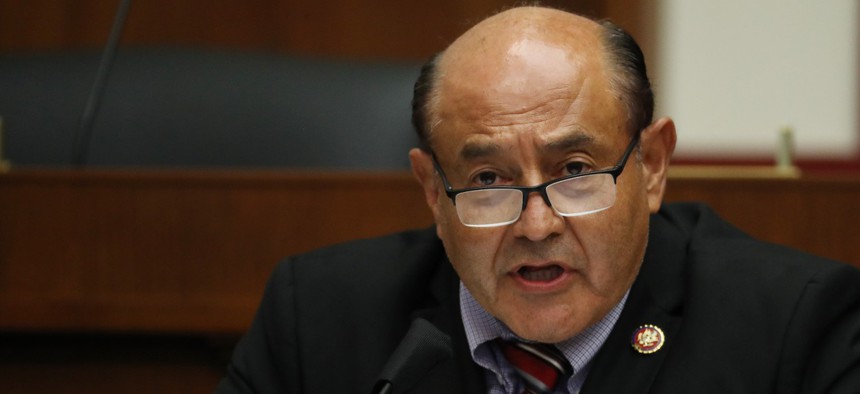
Rep. Lou Correa, D-Calif., noted government buildings are now facing new security risks. Chip Somodevilla / Getty Images
Federal Agencies Are Ignoring Most Building Safety Concerns Flagged by DHS
Lawmakers raise concerns about the non-compliance in light of the recent uptick in threats against feds.
Federal agencies are overwhelmingly ignoring thousands of safety recommendations offered by the government’s internal guard service, officials said on Thursday, often because they decline to cough up the necessary financing.
The Homeland Security Department’s Federal Protective Service, which is in charge of providing security for agencies housed within nearly 10,000 buildings, offers its clients—federal agencies that pay fees for its services—assessments for how to improve their safety measures. Between fiscal years 2017 and 2021, however, agencies implemented just 22% of the 25,000 recommendations the protective service put forward. They closed out 70% without addressing them, according to a review by the Government Accountability Office, while 7% remain open.
Officials from the Federal Protective Service and GAO told the House Homeland Security Committee's panel on Oversight, Management and Accountability that agencies typically pointed to an inability to fund the fixes to explain their failure to heed the advice. Lawmakers expressed particular concern for the unaddressed security shortfalls in light of the recent wave of threats against employees at various agencies.
“As tensions have risen in response to the FBI’s raid on Mar-a-Lago and the passage of the historic Inflation Reduction Act, we have also seen a rise in the threats directed toward federal employees and their office buildings,” said Rep. Lou Correa, D-Calif., who chairs the subcommittee hosting Thursday’s hearing. “While not typically thought of as high security facilities, these government office buildings, and the men and women who work and visit them every day, are now facing new security risks.”
Kris Cline, principal deputy director for the Federal Protective Service, said his agency has taken steps to ramp up security at the FBI, Internal Revenue Service, and National Archives and Records Administration.
“We have increased our protection efforts at those facilities occupied by these agencies and remain prepared to detect, prevent and respond to criminal activities at these locations,” Cline said.
Cline noted that FPS has launched 201 investigations in 2022, stemming primarily from agency reports of employees receiving a specific threatening communication, which have led to 19 arrests. He said he expects more arrests in the coming months and explained the agency has boosted its proactive security efforts in the wake of the Jan. 6 attack at the Capitol Building. In a recent bulletin, the Federal Protective Service instructed federal law enforcement to “remain at a heightened state of vigilance.” It reminded agency leaders to ensure federal facilities are “properly monitored and secured.”
The protective service maintains a relatively small staff of just 1,300 federal personnel, but contracts an additional 15,000 guards. Cline said those employees shift around based on needs, as identified by the agency’s own analysis and in coordination with federal and local law enforcement.
“We know, by facility, where the highest risks are, and where we need to put people,” Cline said.
The security agency is currently experiencing significant staffing shortages, however, with 21% of its authorized positions vacant. Cline said the agency plans to fill all of those by the end of fiscal 2023. He noted the Federal Protective Service is dealing with a tight labor market and competition with other law enforcement agencies.
Lawmakers questioned whether the Federal Protective Service needs more resources, suggesting it is falling short on its mission. They also asked whether their recommendations should be compulsory, rather than up to agency discretion.
“The Capitol Police has thousands of officers for one complex,” said Rep. Richie Torres, D-N.Y. “You have 1,000 officers for 9,500 buildings. There seems to be a disconnect there.”
When Cline said agency headquarters officials often decline to prioritize security improvements at their field offices, Correa responded that the Federal Protective Service must be more forceful.
“This has been going on for a number of years, non-compliance,” Correa said. “This is unacceptable.”
House Democrats are already probing the Biden administration's response to the uptick in threats against feds and have told FPS they would push for more funding for the agency rather than requiring it to rely solely on the “basic security fee” agencies pay. Several agencies in recent weeks have taken steps to warn employees of threats they have received or observed, including the FBI, Environmental Protection Agency and National Archives and Records Administration. The Internal Revenue Service, which has come under fire from Republican lawmakers and other conservative figures after President Biden signed into law the Inflation Reduction Act and its provision to boost IRS funding and hiring, has launched a comprehensive review of the agency's safety measures.







